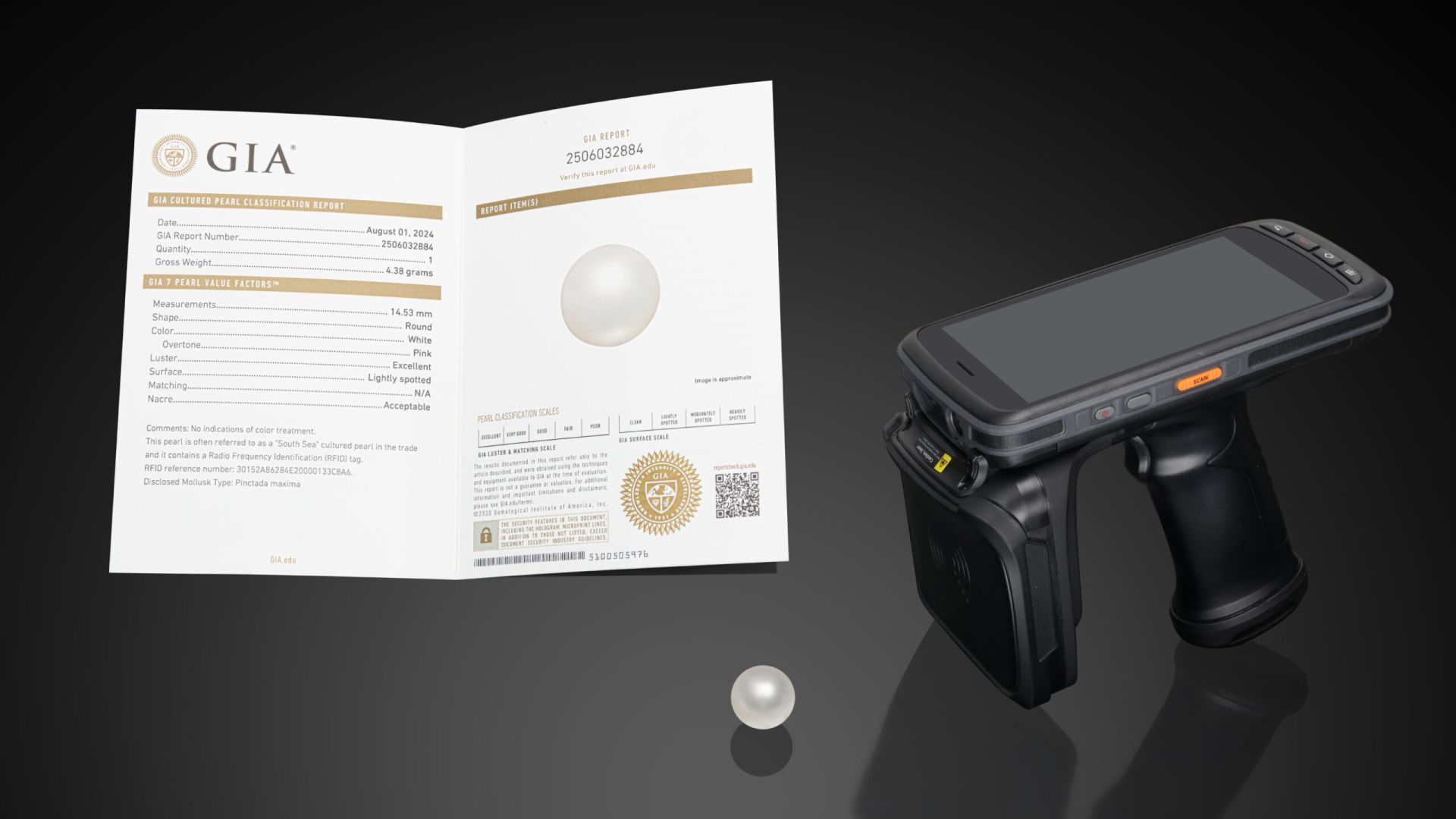Fukui Shell Nucleus Factory uses patented technology to trace cultured pearls
GIA Cultured Pearl report & RFID technology

Pictured is a South Sea cultured pearl containing an RFID tag, an RFID reader, and a GIA Cultured Pearl Classification Report describing the RFID reference number.
Carlsbad, Sept. 18, 2024 (GLOBE NEWSWIRE) — Technology developed by Hong Kong-based Fukui Shell Nucleus Factory creates opportunities for tracing cultured pearls through the supply chain. GIA (Gemological Institute of America) reports for cultured pearls containing the bead nuclei embedded with radio frequency identification (RFID) tags will now receive a report comment with the unique RFID reference number of the pearl, advancing tracing capability and source transparency.
Fukui Shell Nucleus Factory recently submitted a batch of bead-cultured akoya, South Sea, and Tahitian pearls to GIA, each embedded with a unique RFID chip using patented pearl authentication technology. After a decade of development, Fukui Shell Nucleus Factory is expanding the tracking technology to major pearl producers from French Polynesia, Myanmar, Indonesia, Japan and China.
“As sustainability becomes increasingly important to consumers, this technology can play a vital role in telling the complete story of these gems,” said Tom Moses, GIA executive vice president and chief laboratory and research officer. “The integration of RFID details with GIA Cultured Pearl Reports represents a significant step forward in efforts to enhance traceability and transparency in the pearl industry.”
The Fukui Shell Nucleus Factory technology, Metakaku®, embeds a wireless RFID digital tag into the pearl’s nucleus so its origin and movement along the supply chain can easily be tracked. Adding the reference tracking number, detected by an RFID reader during GIA’s examination of the pearl, to the GIA Cultured Pearl Classification Reports uniquely identifies each pearl, matching it with its quality attributes based on The GIA 7 Pearl Value Factors.
While tracing pearls from farm to market remains challenging, sustainability is an increasingly important topic. When the pearl has been sustainably cultured and successfully traced, it tells an incredible story reflecting the journey of the oysters and mussels from which they are harvested.
“Stories have the power to create meaningful connections with pearls, inspiring us to seek deeper understanding and build stronger bonds with these precious gems. Through Metakaku®, we hope to provide value and new perspectives that encourage exploration and inspire greater opportunities for every single pearl that is harvested,” said David Wong, innovator of Metakaku®.
GIA, best known for creating the 4Cs and the GIA International Diamond Grading System™, has been a leader in identifying and classifying natural and cultured pearls since 1949. GIA has contributed to revising the U.S. Federal Trade Commission’s pearl guidelines for the jewelry industry and is responsible for working with major pearl companies globally to develop comprehensive standards for describing pearls. These standards are the GIA 7 Pearl Value Factors™: Size, Shape, Color, Nacre, Luster, Surface and Matching.
For press inquiries, please contact Nellie Barnett at nbarnett@gia.edu or +1 760-603-4184.
About GIA
An independent nonprofit organization, GIA (Gemological Institute of America), established in 1931, is recognized as the world’s foremost authority in gemology. GIA invented the famous 4Cs of Color, Clarity, Cut and Carat Weight and, in 1953, created the International Diamond Grading System™ which is recognized around the world as the standard for diamond quality.
Through research, education, gemological laboratory services and instrument development, the Institute is dedicated to ensuring the public trust in gems and jewelry by upholding the highest standards of integrity, academics, science and professionalism. Visit GIA.edu.




